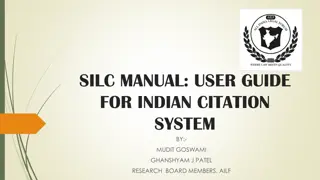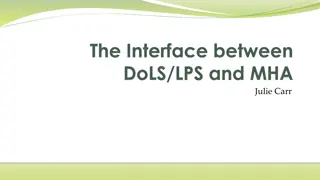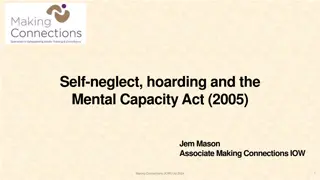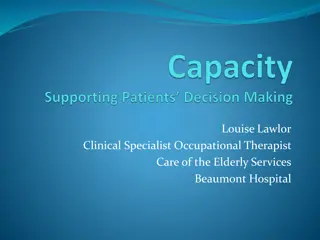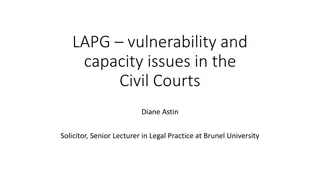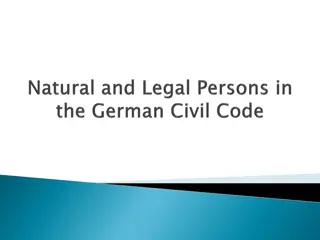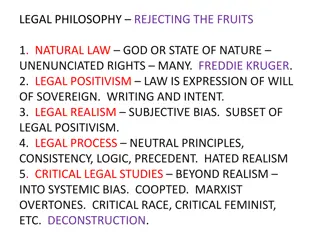Exploring Key Distinctions in Legal and Mental Capacity Frameworks
This presentation delves into the crucial distinctions within the legal and mental capacity frameworks, focusing on concepts such as legal personhood, legal capacity, and mental capacity as defined in the MCA (NI) 2016. It explores the implications of these distinctions on decision-making abilities and the rights and duties individuals hold within the legal system.
Download Presentation

Please find below an Image/Link to download the presentation.
The content on the website is provided AS IS for your information and personal use only. It may not be sold, licensed, or shared on other websites without obtaining consent from the author. Download presentation by click this link. If you encounter any issues during the download, it is possible that the publisher has removed the file from their server.
E N D
Presentation Transcript
Exploring the options Dr Colin Harper, Dr Phil Anderson and Prof Gavin Davidson
Overview of the presentation Key distinctions in the conceptual framework Adolescent brain changes and its implications Possible options to address these issues
Key distinctions in the conceptual framework Legal personhood Legal capacity Mental capacity Developmental capacity Distinguishing things does not imply that they are necessarily real.
Legal personhood The capacity to have rights and duties in a legal system Equal possession of legal capacity does not mean that two people have the same rights and duties Not only natural persons have legal personhood for example, a company can
Legal capacity A person s authority under law to make a particular decision, engage in a particular undertaking, or have a particular status Examples are the rights to: Get married Vote Enter an employment contract Legal capacity does not in itself depend on having particular abilities
Mental capacity (as defined in MCA (NI) 2016) 3(1) a person who is 16 or over lacks capacity in relation to a matter if, at the material time, the person is unable to make a decision for himself or herself about the matter (within the meaning given by section 4) because of an impairment of, or a disturbance in the functioning of, the mind or brain.
Mental capacity (as defined in MCA (NI) 2016) 3. (1) For the purposes of this Act, a person who is 16 or over lacks capacity in relation to a matter if, at the material time, the person is unable to make a decision for himself or herself about the matter (within the meaning given by section 4) because of an impairment of, or a disturbance in the functioning of, the mind or brain.
Mental capacity (as defined in MCA (NI) 2016) 4. (1) For the purposes of this Part a person is unable to make a decision for himself or herself about a matter if the person (a) is not able to understand the information relevant to the decision; (b) is not able to retain that information for the time required to make the decision; (c) is not able to appreciate the relevance of that information and to use and weigh that information as part of the process of making the decision; or (d) is not able to communicate his or her decision (whether by talking, using sign language or any other means);
Developmental capacity Developmental capacity refers to the emerging or developing capacity of a child to make decisions and is the result of the natural development of the child towards maturity. The age at which developmental capacity is no longer material is set by laws which establish full legal capacity for all or legal capacity for a particular decision or group of decisions.
How does these different capacities interact? Legal personality has been restricted for some human persons: e.g. gender, slavery, disability, children. Legal personality can never justly be restricted for human persons, including for children. Legal capacity can justly be restricted on the basis of developmental capacity or mental capacity.
An Adolescent and Neurodevelopmental Lens Background Forensic Child and Adolescent Mental Health Service for Northern Ireland [FCAMHSNI] ACORN Therapeutic Service for Northern Ireland
Significant advances in understanding of adolescent brain development, since 1990s. Impact of new brain imaging techniques Historical consensus was that the first 8 years of childhood, were the most critical period of brain development, after which there was relatively limited further development However, the current scientific consensus is that there is a 2nd period of substantial and distinct brain development in adolescence
Changes in Adolescent Brain These changes in the adolescent brain are readily visible on MRI with significant changes in the grey and white matter components of the brain MRI scans also demonstrate the activation of brain regions significantly differs between adolescents and adults, when they are completing the same tasks Furthermore, the adolescent brain is now recognised to be highly plastic and having more capacity, relative to the adult brain, for positive change with well targeted interventions.
Functional Implications of Adolescent Brain Changes Include a substantial predisposition towards; Taking risks versus safety Preoccupation with peer influence Hypersensitivity to social exclusion
Relevance of Changes The adolescent population is demonstrably and materially different to the adult and pre-adolescent population Legislative approaches to all issues of emerging capacity, needs to give consideration to this current scientific understanding
Possible options Retain the current combination of statute law but develop new guidance Codify case law to clarify under what circumstances those aged under 16 can accept and refuse interventions Amend the Children (NI) Order 1995 to provide a more comprehensive framework for decision making Extend the Mental Capacity Act (Northern Ireland) 2016 to apply to everyone Develop a new law specifically for those aged under 16







